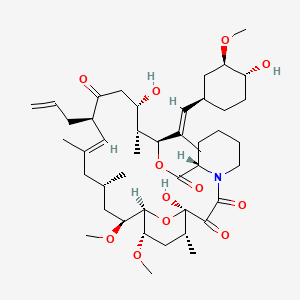tacrolimus
Tacrolimus is a lipid of Polyketides (PK) class. Tacrolimus is associated with abnormalities such as Renal glomerular disease. The involved functions are known as inhibitors, Fungicidal activity, Metabolic Inhibition, Excretory function and Dephosphorylation. Tacrolimus often locates in Hepatic, Mitochondrial matrix and Inner mitochondrial membrane. The associated genes with Tacrolimus are RHOA gene and BGN gene.
Cross Reference
Introduction
To understand associated biological information of tacrolimus, we collected biological information of abnormalities, associated pathways, cellular/molecular locations, biological functions, related genes/proteins, lipids and common seen animal/experimental models with organized paragraphs from literatures.
What diseases are associated with tacrolimus?
tacrolimus is suspected in Renal glomerular disease, Candidiasis, Mycoses, PARKINSON DISEASE, LATE-ONSET, Morphologically altered structure, Skin Diseases, Infectious and other diseases in descending order of the highest number of associated sentences.
Related references are mostly published in these journals:
- Antimicrob. Agents Chemother. (2)
- Am. J. Physiol. Renal Physiol. (1)
- Drug Metab. Dispos. (1)
- Others (1)
| Disease | Cross reference | Weighted score | Related literature |
|---|
Possible diseases from mapped MeSH terms on references
We collected disease MeSH terms mapped to the references associated with tacrolimus
PubChem Associated disorders and diseases
What pathways are associated with tacrolimus
There are no associated biomedical information in the current reference collection.
PubChem Biomolecular Interactions and Pathways
Link to PubChem Biomolecular Interactions and PathwaysWhat cellular locations are associated with tacrolimus?
Visualization in cellular structure
Associated locations are in red color. Not associated locations are in black.
Related references are published most in these journals:
| Location | Cross reference | Weighted score | Related literatures |
|---|
What functions are associated with tacrolimus?
Related references are published most in these journals:
| Function | Cross reference | Weighted score | Related literatures |
|---|
What lipids are associated with tacrolimus?
Related references are published most in these journals:
| Lipid concept | Cross reference | Weighted score | Related literatures |
|---|
What genes are associated with tacrolimus?
Related references are published most in these journals:
| Gene | Cross reference | Weighted score | Related literatures |
|---|
What common seen animal models are associated with tacrolimus?
There are no associated biomedical information in the current reference collection.
NCBI Entrez Crosslinks
All references with tacrolimus
Download all related citations| Authors | Title | Published | Journal | PubMed Link |
|---|---|---|---|---|
| Sakamoto K et al. | Analysis of long-term acceptance of xenografts in rats induced by short-term administration of FK506. | 1989 | Transplant. Proc. | pmid:2468222 |
| Nakajima K et al. | Effects of 15-deoxyspergualin and FK506 on the histology and survival of hamster-to-rat cardiac xenotransplantation. | 1989 | Transplant. Proc. | pmid:2468223 |
| Ochiai T et al. | Comparative studies on the immunosuppressive activity of FK506, 15-deoxyspergualin, and cyclosporine. | 1989 | Transplant. Proc. | pmid:2468228 |
| Yasunami Y et al. | Effects of a novel immunosuppressive agent, FK-506, on islet allograft survival in the rat. | 1989 | Transplant. Proc. | pmid:2468234 |
| Kobayashi C et al. | Suppression of corneal graft rejection in rabbits by a new immunosuppressive agent, FK-506. | 1989 | Transplant. Proc. | pmid:2468254 |
| Kuroki H et al. | Experimental studies of vascularized allogeneic limb transplantation in the rat using a new immunosuppressive agent, FK-506: morphological and immunological analysis. | 1989 | Transplant. Proc. | pmid:2468255 |
| Arai K et al. | Prolonged limb allograft survival with short-term treatment with FK-506 in rats. | 1989 | Transplant. Proc. | pmid:2468256 |
| Ishibashi M et al. | Immunopharmacologic effects of immunosuppressive agents explored by a new effector monocyte generation assay. | 1989 | Transplant. Proc. | pmid:2469228 |
| Starzl TE et al. | Liver transplantation: an unfinished product. | 1989 | Transplant. Proc. | pmid:2469232 |
| Hatanaka H et al. | FK-506 related compounds produced by Streptomyces tsukubaensis No. 9993. | 1989 | J. Antibiot. | pmid:2470720 |
| Gschwendt M et al. | The immunosuppressant FK-506, like cyclosporins and didemnin B, inhibits calmodulin-dependent phosphorylation of the elongation factor 2 in vitro and biological effects of the phorbol ester TPA on mouse skin in vivo. | 1989 | Immunobiology | pmid:2471685 |
| Fujii Y et al. | Effect of a novel immunosuppressive agent, FK506, on mitogen-induced inositol phospholipid degradation in rat thymocytes. | 1989 | Transplantation | pmid:2472025 |
| Tocci MJ et al. | The immunosuppressant FK506 selectively inhibits expression of early T cell activation genes. | 1989 | J. Immunol. | pmid:2472451 |
| Beck Y and Akiyama N | Effect of FK-506 and cyclosporine on human lymphocyte responses in vitro. | 1989 | Transplant. Proc. | pmid:2472695 |
| Thomson AW | FK-506--how much potential? | 1989 | Immunol. Today | pmid:2473767 |
| Walliser P et al. | Inhibition of murine B-lymphocyte proliferation by the novel immunosuppressive drug FK-506. | 1989 | Immunology | pmid:2480331 |
| Aoki M et al. | [Histological observations of immunosuppressive effects of FK-506 in canine lung allotransplantation]. | 1989 | Bull Chest Dis Res Inst Kyoto Univ | pmid:2482787 |
| Kay JE and Benzie CR | T lymphocyte activation through the C28 pathway is insensitive to inhibition by the immunosuppressive drug FK-506. | 1989 | Immunol. Lett. | pmid:2483716 |
| Leonard DK et al. | Toxicity of FK-506 in human fetal pancreas. | 1989 | Diabetes | pmid:2463195 |
| Stephen M et al. | Immunosuppressive activity, lymphocyte subset analysis, and acute toxicity of FK-506 in the rat. A comparative and combination study with cyclosporine. | 1989 | Transplantation | pmid:2463701 |
